The Supreme Court Is Poised to Rescue Donald Trump
If Trump is granted presidential immunity in Jack Smith’s election subversion case, say goodbye to the rule of law.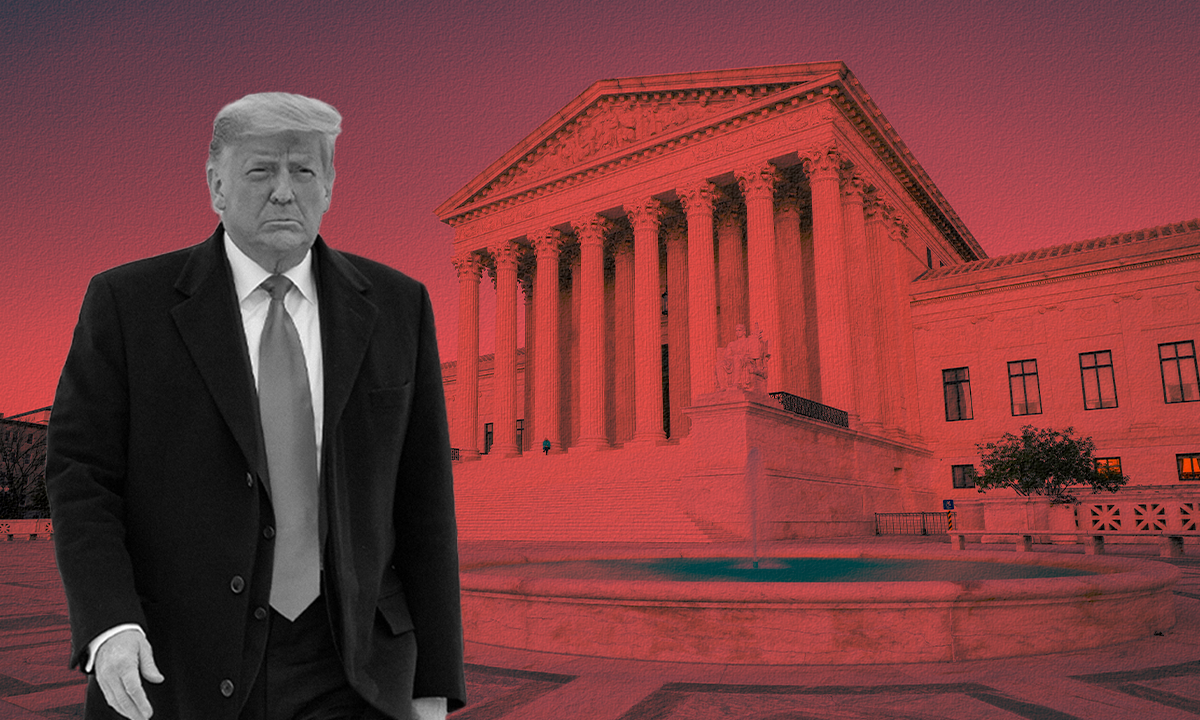 Graphic by Truthdig. Sourced images via Adobe Stock and Public Domain
Graphic by Truthdig. Sourced images via Adobe Stock and Public Domain
Should Donald Trump be accorded immunity from criminal prosecution for attempting to overturn the results of the 2020 election? If you think the question is a no-brainer for the nine elite lawyers who comprise the Supreme Court, I have bad tidings. The court that annulled Roe v. Wade, gutted the Voting Rights Act and reinterpreted the Second Amendment to transform the U.S. into a legalized shooting gallery is unlikely to save our withering democracy from Trump or future presidents who think they are above the law.
Last Thursday, the court heard oral arguments in the election-subversion case brought against Trump by Justice Department Special Counsel Jack Smith. Although it is difficult to predict the outcome of Supreme Court cases from the content and tone of oral arguments, it is safe to say that the day went poorly for Smith. While none of the justices seemed prepared to give Trump the absolute immunity he is demanding, the panel’s six Republican appointees signaled repeatedly, during the marathon 160-minute hearing, that they will offer him a limited but substantial degree of protection. This will effectively delay his subversion trial until after the next election, if not derail the trial altogether.
It was clear the fix was in when Justice Clarence Thomas took his usual seat on the bench next to Chief Justice John Roberts. By any fair standard of judicial integrity, Thomas should have recused himself in light of his insurrectionist wife Ginni’s outspoken and zealous support of Trump’s “big lie” about the 2020 election. But Thomas has no integrity and knows no shame.
As the court’s most senior associate justice, Thomas led off the hearing with a softball question to Trump’s lead attorney, former Missouri Solicitor General D. John Sauer, about the legal source of the immunity claim.
Although it is difficult to predict the outcome of Supreme Court cases from the content and tone of oral arguments, it is safe to say that the day went poorly for Smith.
“The source of the immunity,” Sauer replied, is “rooted” in the Constitution, “principally…in the Executive Vesting Clause of Article II, Section 1.” The clause, he said, not only vests the president with the powers explicitly listed in Article II [such as the authority to appoint ambassadors], but also encompasses “all powers that were originally understood to be included” within the president’s purview.
There is, of course, nothing in Article II or any other section of the Constitution that confers immunity from criminal prosecution on sitting or former presidents who have broken the law. As many constitutional scholars have noted, Trump’s immunity claim finds no support in “originalism” as a theory of constitutional interpretation. The actual debates of the founding era were focused on setting limits to the powers of the presidency. The founding generation had many faults, but to its credit, it did not intend to swap a British king for an American monarch.
No matter. Thomas permitted Sauer to lay out his theory and allowed his bludgeoning of history to pass. Accelerating into full Trump-mode, Sauer declared that under the doctrine of separation of powers, presidents must be given immunity from judicial scrutiny of their “official acts.” Otherwise, he argued:
If a president can be charged, put on trial and imprisoned for his most controversial decisions as soon as he leaves office, that looming threat will distort the president’s decision-making precisely when bold and fearless action is most needed. Every current president will face de facto blackmail and extortion by his political rivals while he is still in office.
The distinction between a president’s official and personal acts was addressed by the Supreme Court in Nixon v. Fitzgerald, a 1982 decision involving a wrongful termination lawsuit brought by a federal contractor against disgraced former president Richard Nixon. Fitzgerald held that presidents are entitled to “absolute immunity” in civil cases seeking damages arising from their official acts and acts “within the outer perimeter” of their official duties. Sauer urged the court to import the Fitzgerald standard to criminal law.
Sauer’s proposal set off alarm bells among the court’s three Democratic appointees.
“How about if the president orders the military to stage a coup?,” asked Justice Elena Kagan.
Sauer’s proposal set off alarm bells among the court’s three Democratic appointees.
“If the president decides that his rival is a corrupt person and he orders the military or orders someone to assassinate him, is that within his official acts for which he can get immunity?” Justice Sonia Sotomayor inquired.
Both hypotheticals, Sauer answered, could be deemed official acts warranting immunity, depending on the surrounding circumstances.
Summing up the implications of Sauer’s position, Justice Ketanji Brown Jackson predicted that the president could become the “most powerful person in the world and [have] no potential penalty for committing crimes. I’m trying to understand what the disincentive is for turning the Oval Office into…the seat of criminal activity in this country.”
Following Sauer at the lectern on behalf of the government, Michael Dreeben, a former deputy solicitor general and veteran Supreme Court litigator, sounded dismayed. “There is no immunity that is in the Constitution,” he reminded the justices, “unless this Court creates it today.”
That, it seems, is precisely the goal of the court’s reactionary majority.
“We’re writing a rule for the ages,” Justice Neil Gorsuch, Trump’s first Supreme Court appointee, told Dreeben. Justice Brett Kavanaugh, Trump’s second high-court appointee, added approvingly, “This case has huge implications for the presidency, for the future of the presidency, for the future of the country.”
None displayed more contempt for Special Counsel Smith than Justice Samuel Alito, author of the Dobbs decision that jettisoned Roe. The real danger facing the country, Alito asserted, comes not from insurrectionist presidents but from overzealous deep-state prosecutors seeking to harm their political opponents, leading “us into a cycle that destabilizes the functioning of our country as a democracy…”
Taken aback by the Orwellian nature of Alito’s reasoning, Dreeben could only respond, “I think it’s exactly the opposite, Justice Alito.”
None displayed more contempt for Special Counsel Smith than Justice Samuel Alito, author of the Dobbs decision that jettisoned Roe.
The thinnest of silver linings appeared in a colloquy between Dreeben and Justice Amy Coney Barrett, Trump’s third appointee, who suggested the case could be remanded to District Court Judge Tanya Chutkan to segregate the official acts alleged in the indictment lodged against Trump from the personal acts Trump undertook during his reelection campaign. This would allow the trial to proceed for personal conduct only.
But even assuming that such segregation is technically possible, and that Chief Justice Roberts would provide a decisive fifth vote in favor of Barrett’s solution, the trial would inevitably be delayed until after the next election. And that would suit Trump just fine.
Delay is central to the Trump game plan. If he wins in November, he will be able to dismiss the federal prosecutions against him and leverage the power of the presidency to halt any remaining state litigation in New York and Georgia for the duration of his second term. All he needs is a little help from his friends.
Your support matters…Independent journalism is under threat and overshadowed by heavily funded mainstream media.
You can help level the playing field. Become a member.
Your tax-deductible contribution keeps us digging beneath the headlines to give you thought-provoking, investigative reporting and analysis that unearths what's really happening- without compromise.
Give today to support our courageous, independent journalists.
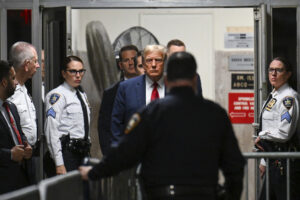
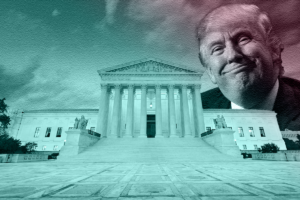
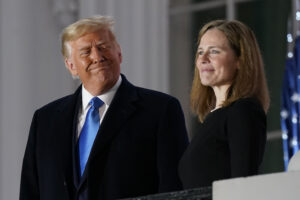
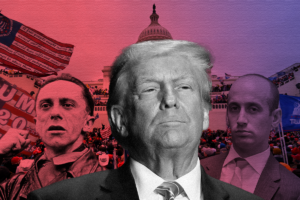
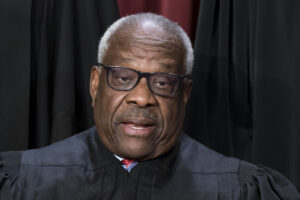
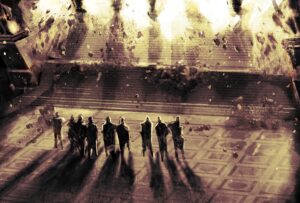
You need to be a supporter to comment.
There are currently no responses to this article.
Be the first to respond.